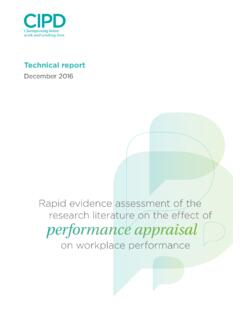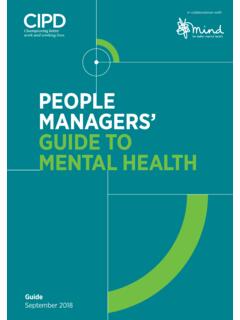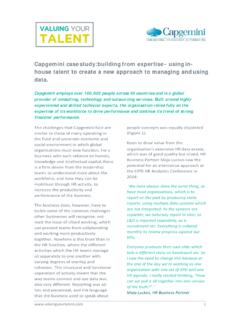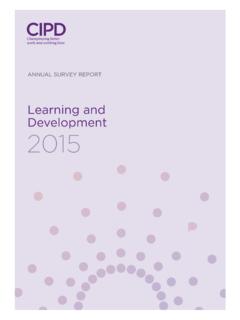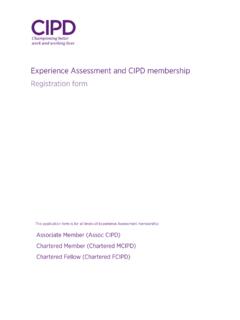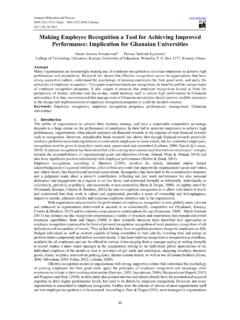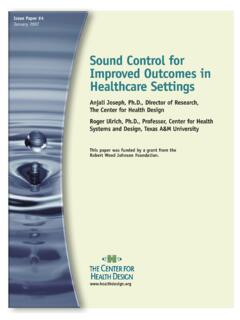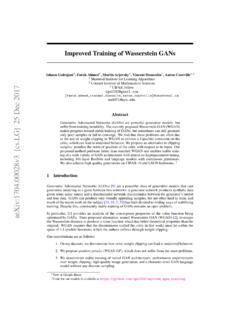Transcription of Could do better 2016 assessing what works in performance ...
1 Research report December 2016 Could do better ? assessing what works in performance managementThe CIPD is the professional body for HR and people development. The not-for-profit organisation champions better work and working lives and has been setting the benchmark for excellence in people and organisation development for more than 100 years. It has more than 140,000 members across the world, provides thought leadership through independent research on the world of work, and offers professional training and accreditation for those working in HR and learning and | Could do better ? assessing what works in performance managementCould do better ? assessing what works in performance managementResearch reportThis report was written by Jonny Gifford, the CIPD s Adviser for Organisational Behaviour, based on two rapid evidence assessments (REAs) carried out by the Center for Evidence-Based Management (CEBMa).
2 We would like to thank the CEBMa team that conducted the REA research: Dr Eric Barends, Barbara Janssen, Pietro Marenco and Cedric Velghe, who worked with the support of Professor Rob Briner and Professor Denise CEBMaThe Center for Evidence-Based Management is a non-profit member organisation dedicated to promoting evidence-based practice in the field of management. It provides support and resources to managers, consultants, organisations, teachers, academics and others interested in learning more about evidence-based center forEvidence-Based Management 1 | Could do better ? assessing what works in performance managementContentsForeword 2 Executive summary 3 Introduction 51 performance management
3 Revolution? 72 Goal setting and appraisals: what s supposed to happen? 103 Do targets and appraisals generally work? 144 What works in goal setting (and what doesn t)? 165 What works in performance appraisals (and what doesn t)? 226 Ratings bias and what to do about it 27 Conclusion 35 Appendix: methodology 38 References 40 The research role of a professional body is not only to highlight interesting new practices in people management, it also seeks to evaluate the evidence and provide a critical eye on practice and the contexts in which these operate.
4 While the immediate aim of a research report is to inform, it also hopes to provide a sound basis on which organisations may reflect on their current practice and to build the internal capability to use these critically to support their choices. This report focuses on the perennial issue of performance evaluation. We ve seen headline claims that appraisals have been abandoned by some corporate household names. By and large, it s the formal annual appraisal that has been replaced with more frequent, informal exchanges all in pursuit of an improved alignment and outcome in terms of performance , interpersonal relationships and perceived fairness. The aims of performance appraisals are understandably myriad and complex.
5 Oftentimes it is seen as a primary tool for clarifying an employee s objective contribution to a corporate goal and consequently its vision. Enforced ratings, for example, are part of that discourse of measurement and scientific management. It feels more objective to reduce work performance to a score. But appraisals are also inter-subjective. Alone, we can never tell if our judgement is appropriate. In order to establish what is real and measurable, we check, consciously or unconsciously, our perceptions with others (including the assessed) and then confirm our measure of their is by no means a certain or satisfactory approach to establish that correlation between a score and organisational success; hence the report.
6 Here we entrust the judgement of evidence as to what works or not to research and research methodology. While, that too is not immune from subjectivity, it at least approaches it with some dispassion. The report by Jonny Gifford critically evaluates available academic studies and metastudies on this subject, and consequently their findings and assumptions. This more critical approach will be used occasionally to investigate other problematic organisational issues as part of our continued work with the Center for Evidence-based Management (CEBMa). What this report sets out to do is to deconstruct the appraisal process to some fundamental components and then to examine the weight of evidence around these - the aims and process of goal setting; the boundedness and complexity of the tasks; the dynamics of evaluation including interpersonal bias; the interpersonal dynamic between the assessor and the assessed; limitations of rating methods, and the nature of s a rich report that offers much food for thought.
7 We hope that this report will both provoke and Wilson WongHead of Insight and FuturesCIPDF oreword2 | Could do better ? assessing what works in performance management3 | Could do better ? assessing what works in performance managementThis report presents and discusses a review of the academic research on two core aspects of performance management: goal setting and performance appraisals. It is based on two rapid evidence assessments (REAs) a truncated form of systematic review and can be considered the best available evidence on the subjects find that goal setting is rather like prescriptive medication, in that it certainly works , but can be easy to misapply or get the wrong dosage . In particular, specific and challenging goals are generally a powerful motivator, but can detract from what needs to be focused on in complex tasks that involve navigating interrelated steps or stages, adapting to unfamiliar cues, developing new skills or making decisions based on data analysis.
8 In such circumstances, do-your-best directives and goals focused on learning and behaviour will do more to help employees focus and perform setting is intrinsically linked to appraisals, in that its power to improve performance rests on monitoring progress and feedback. This confirms that performance management should be seen as a continuous chain of connected activities, not as a discrete process that is occasionally of the best quality research on performance appraisal demonstrates that feedback generally contributes to performance , but there is a great deal of variation: in many cases it has no effect or even worsens performance . Getting it right is thus crucial, but the research also clearly shows that this is not a simple task.
9 There is certainly no universal template to follow contextual factors such as job type should always be taken into account and the overall number of issues in making performance appraisal an effective process is course of action we would recommend to employers is to appraise the appraisal . It is not the processes per se that are important, so much as employees reactions to them, and these are particularly influenced by how fair and useful they experience performance appraisal to be. The research shows that a number of aspects of appraisal in turn influence its perceived fairness, but given how straightforward it is to consult employees, it would seem sensible both to ask them their views of appraisal processes in general, and to check in with them following appraisal meetings.
10 If an employee feels unfairly treated, unsupported or demotivated the day after an appraisal, performance management Could unravel at that point and it s clear more conversation or action is assessing employee performance requires managers to apply standardised measures or ratings. Unfortunately, there are a number of potential sources of bias in this, especially from the raters or managers themselves, and many of these may not be conscious. Training raters and making them more accountable for their evaluations both help reduce bias and make appraisals more accurate. However, a more fundamental question relates to the purpose of appraisal. Managers go about assessments in cognitively different ways, with different results, when they are used for administrative purposes (such as to inform pay decisions) than when they are used for developmental purposes.
